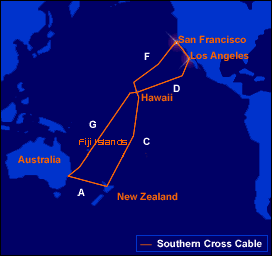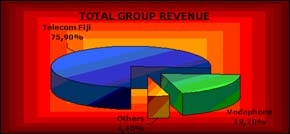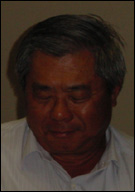 THE WORLD
ONLY A DIAL AWAY THE WORLD
ONLY A DIAL AWAY |

For a small island nation with not even one million
inhabitants, Fiji has a very well developed telecommunication
system. Its access to the Southern Cross cable that
links New Zealand, Australia and North America gives
the country a reliable and efficient telecom network.
Overseas telecommunication traffic is handled by
FINTEL, a joint venture
between the Fiji Government and UK's Cable and Wireless.
With full landing in Fiji and a satellite earth
station in Vatuwaqa, near Suva, FINTEL
plans to utilise all the Southern Cross' capacity
to bring into Fiji broadband transmissions and all
the benefits associated with broadband. This means
all the applications and the content including ISP,
voice, and ICT. FINTEL uses the satellite for the
thin routes around the Pacific and also for domestic
communications to Rotuma for local telecom company,
Telecom Fiji. According to FINTEL's
Chief Executive Officer Philip Richards, FINTEL
has been able to offer Fiji and its users a very
high capacity, high speed and high reliability to
international access. "Our main customer
is Telecom Fiji as most of our traffic goes straight
to Telecom Fiji. We are the link between the domestic
operator and the world. We offer everything that
any customer might need as we have full access to
the Southern Cross as well as to the satellite in
terms of connectivity. We have so much capacity
available today that whatever the customer needs
we tailor our network to meet their requirements."
 Telecom
Monopoly to stay Telecom
Monopoly to stay |
Amalgamated Telecom Holdings is the parent company
of Telecom
Fiji, Vodafone
Fiji and Fiji
Directories, producer of Fiji's yellow pages
and telephone book. In 2003, Telecom Fiji formed
two other subsidiaries: Xceed Pasifika Limited,
to handle its customer premises equipment, and Transtel,
its card services company.
Almost 60 percent of ATH is owned by the Fiji National
Provident Fund. With all its three companies enjoying
a monopoly in the market, ATH has been compared
to a government mint in light of the profit and
dividends it has been paying. Its operating revenue
of $163 million FJD in 2002 (@ $81.5m USD) is a
hike from $152 million FJD in 2001 (@ $76m USD).
Net earnings though declined to $32.9 million FJD
in 2002 (@ $16.45m USD) from $54.7 million FJS (@
$27.35m USD) in 2001. Its assets are now valued
at $284 million FJD (@ $142m USD). Despite its concern
about the withdrawal of its exclusive licence, ATH
has nevertheless undergone structural changes and
makes it a point to highlight its $40 million FJD
capital works (@ $20m USD). It also implemented
the new ISDN broadband service. The company commissioned
an international firm to develop an Internet strategy
and as a result, Internet services became a stand
alone entity, separated from Telecom Fiji, the
ISP Connect .

Telecom Fiji is now positioning itself as a wholesaler
to Internet Service Providers and it is planning
to install three fibre optic rings planned for the
capital city's commercial business district while
ATH says it is investigating further investments,
and negotiating potential joint ventures including
call centre operations. ATH Executive Director Lionel
Yee assures that "ATH is looking at opportunities
generally in the South Pacific Region, this area
is our main expansion strategy. We will be looking
at any business that has a telecommunication component
which we think could add benefits to our shareholders.
We only invest in the area where we attach strategic
importance." When asked about the future
deregulation of the Telecom sector in Fiji, Mr.
Yee said that "if a competitor comes around
in a small economy like Fiji it would be very costly
to put up another infrastructure. In that situation,
ATH will have a big advantage if it has the infrastructure
and this is a strategic consideration."
|
For
Mr. Yee, the world market in Telecommunications
speaks for itself: "It has been a disastrous
year for a lot of Telecommunication companies."
But he welcomes foreign investors in other sectors
of Fiji's economy "because the infrastructure",
he says, "is ready for it. Telecom Fiji
is meeting the challenge and they are working now
on a VSAT project for the rural area to provide
the access they currently do not have."
In Mr. Yee's opinion, "competitors entering
the market will not focus on bringing that access
to those areas, as it is not economically interesting
for them. How this sector can be further developed
must take into account the benefit of both, the
people of Fiji and the shareholders. It is a challenge
for us to make sure that we will be ready for the
moment when Fiji is ready to open up the Telecommunication
sector, so Fiji will benefit further from it."
Mr. Yee is not afraid of the competition because
"strategically", he comments, "if
you control the access you will control the business
so we are not apprehensive of any future competition
arriving in the country. This sector is complexly
structured in Fiji and companies for many years
have been controlling segments of the market. For
example, the international and domestic are separately
licensed. I think ideally these two segments should
be merged."

Telecom
Fiji is 100 percent
owned by ATH and holds the monopoly to provide domestic
transmission of voice and data in Fiji until 2015.
It operates Fiji's only Public Service Telephone
Network (PSTN) and Internet Service. Through Xceed
Pasifika Ltd., Telecom Fiji also competes in the
deregulated market of customer premises equipment
like telephone handsets, PABXs and customer premises
cabling. Former diplomat now Telecom
Fiji Chief Executive Officer Winston Thompson
says Xceed Pacifika Ltd. will be able to sell to
anyone, even those beyond Fiji. "They have
been set up to do business in Fiji but there is
nothing that stops them from seizing opportunities
available in the Pacific region. They will be able
to decide for the future themselves," says
Thompson. Transtel will operate the pay phone business,
all payphones on the streets and all the prepaid
cards. "That equipment is housed in the telecom
premises. All the information is stored in their
platform housed in the Telecom Fiji exchange and
Telecom will continue to manage that on behalf of
the card company but they will actually own it."
Fiji's exchange line capacity of the public switched
telephone network (PSTN) increased to 105,980 in
2002. The number of working lines totalled 92,222,
an increase of 5.3% from 2001. Telephone penetration
rate increased to 11.7 percent per 100 people from
10.6 percent last year. Vodafone Fiji is the country's
sole provider of mobile telephony service, using
the GSM standard. Vodafone International Holdings
BV holds 49 percent shares, leaving Telecom Fiji
to hold majority shares. Connections of cellular
phones reached 80,838 in 2002, up 47 percent from
2001. More cellular mobile base stations have been
commissioned, giving a coverage of 49.5% of Fiji's
population. Fiji Directories looks after the yellow
and white
pages information sections as well as customers
e-mail and web site linking services. Recently,
it began offering an on-line advertising facility
through the Internet. |

